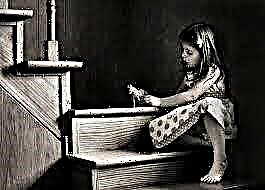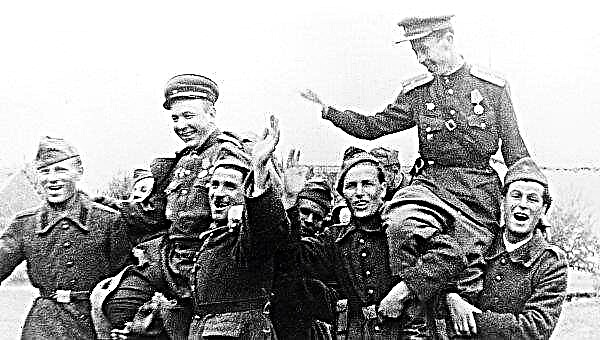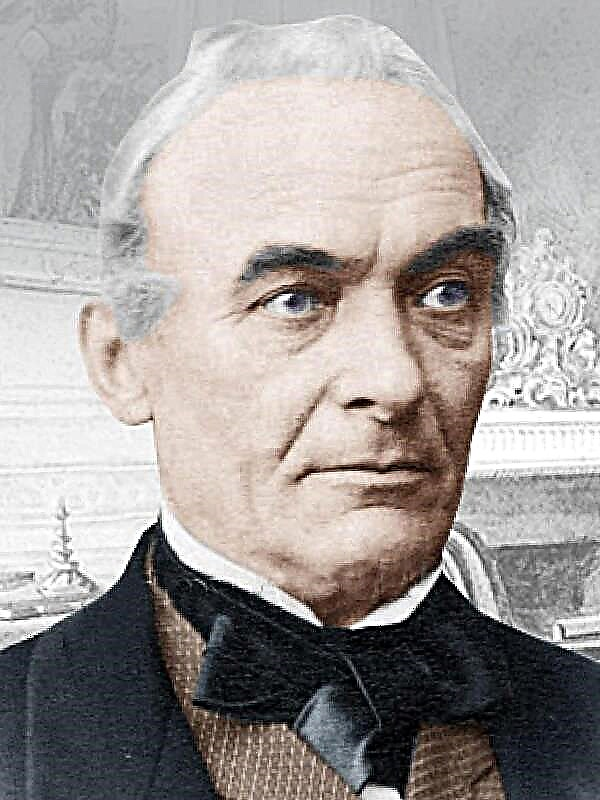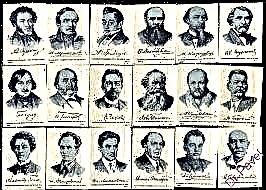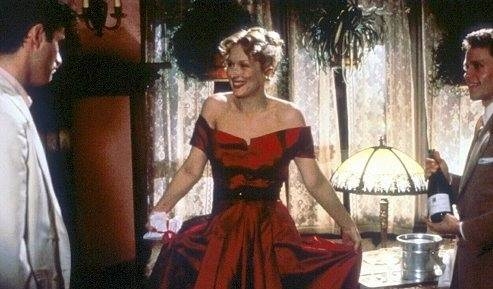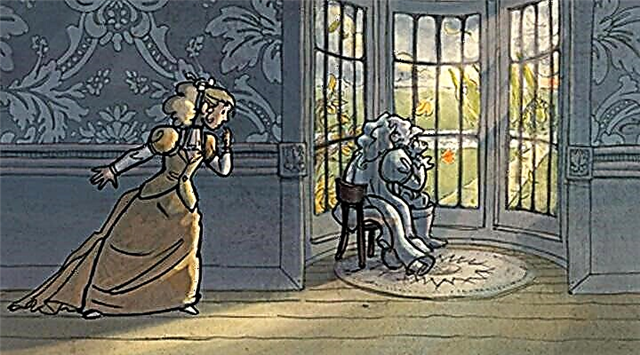The narrative hero Bromden - the son of a white woman and an Indian leader - pretends to be weak, deaf and dumb. He has long been in a psychiatric hospital, fleeing within its walls from the cruelty and indifference of "normal America." However, the years spent by Bromden in the psychiatric hospital are making themselves felt. Miss Gnusen's head nurse, who leads both patients and the weak-willed Dr. Spivey, regulates, in his opinion, the running of time, forcing the clock to fly rapidly, then endlessly. According to her order, they include a “foggy car”, and the pills that are given to patients contain electronic circuits and help control the consciousness of “acute” and “chronicles” from the outside. According to Bromden, this department is a factory in a sinister and mysterious Combine: “here, mistakes made in the neighborhood in churches and schools are corrected. When the finished product is returned to society, completely repaired, no worse than a new, or even better, elder sister’s heart rejoices. ”
One day, Randle Patrick McMurphy arrives at this place of sorrow, having managed to wander around America and spend time in many of its prisons. He was serving his last term in the colony, where he showed “psychopathic tendencies” and now he has been transferred to a mental hospital. However, he accepted the translation without disappointment. An inveterate gambler, he expects to improve his financial affairs at the expense of burdock psychos, and the order in the hospital, according to rumors, is much more democratic than before.
In fact, the department flaunts its liberal principles, and the representative of the public relations administration conducts excursions every now and then, praising new trends in every way. Patients are well-fed, encouraged to cooperate with medical staff, and all the most important problems are solved by voting on the patient’s council, headed by a certain Harding who has a higher education and is distinguished by eloquence and a complete lack of will. “We are all rabbits,” he tells McMurphy, “and we are not here because we are rabbits, but because we cannot get used to our rabbit position.”
McMurphy is anyone but a rabbit. Intending to “tidy up this shop”, from the very first days he comes into conflict with the imperious Miss Gnusen. The fact that he jokingly outplayed the patients with cards is not so bad for her, but he jeopardizes the measured activities of the “therapeutic community”, ridicules meetings in which, under the vigilant supervision of an older sister, patients habitually delve into someone else's personal life. This systematic humiliation of people is carried out under the demagogic slogan of educating their existence in the team, the desire to create a democratic department, fully controlled by patients.
McMurphy does not fit into the totalitarian idyll of a mental hospital. He encourages his comrades to break free, break the window and break the net with a heavy remote control, and even bet he is capable of doing this. When his attempt ends in failure, then, paying off, or rather, returning the notes, he says: “At least I tried.”
The next clash between McMurphy and Miss Gnusen occurs over the TV. He asks to shift the schedule for watching television so that you can watch baseball. The question is put to the vote, and it is supported only by Cheswick, known for his obstinacy in words, but his inability to translate his intentions into action. However, he soon succeeds in securing a second vote, and all twenty “sharp” ones vote to watch TV during the day.McMurphy is triumphant, but the older sister tells him that in order for a decision to be made, a majority is needed, and since there are forty people in the department, one more vote is missing. In fact, this is a hidden mockery, since the remaining twenty patients are chronicles, completely cut off from objective reality. But then Bromden raises his hand, going against his life’s rule “not to open”. But even this is not enough, as he raised his hand after the meeting was declared closed. Then McMurphy arbitrarily turns on the TV and does not leave it, even when Miss Gnusen turns off the electricity. He and his comrades are looking at a blank screen and are "sick" with might and main.
According to doctors, McMurphy is a "mess factor." The question arises of transferring him to a riotous department, and more radical measures are being proposed. But Miss Gnusen is against it. She needs to break him in the department, to prove to everyone else that he is not a hero, not a rebel, but a cunning egocentric who cares about his own good.
In the meantime, the "fatal" influence of McMurphy on patients is obvious. Under his influence, Bromden notes that the “foggy car” suddenly broke, he begins to see the world with the same clarity. But McMurphy himself temporarily tempers his rebellious ardor. He learns the sad truth: if he was sent to a colony for a period determined by a court, then he was placed in a mental hospital until the doctors consider him in need of treatment, and, therefore, his fate is entirely in their hands.
He ceases to intercede for other patients, shows caution in clarifying relations with his superiors. Such changes entail tragic consequences. Having taken the example of McMurphy, Cheswick fiercely fights for the right to smoke cigarettes anytime and anytime, gets into the riotous department, and then upon returning tells McMurphy that he fully understands his position and soon commits suicide.
This death makes a strong impression on McMurphy, but even more astonishing is the fact that the vast majority of Miss Gnusen's patients are here of their own free will. With renewed vigor, he renews the war with his older sister and at the same time teaches patients to feel like full members of society. He puts together a basketball team, calls the orderlies to a contest, and although the match is lost, the main goal is achieved - the patient players felt like people. It was McMurphy who saw through Bromden, realizing that he was only pretending to be deaf and dumb. He instills confidence in himself and his powers in Bromden, and under his leadership he tries to lift the heavy console, each time tearing him higher and higher off the floor.
Soon, McMurphy comes up with a seemingly crazy idea: to go the whole compartment at sea on a boat to catch salmon, and, despite Miss Gnusen's exhortations, the team gathers. And although the captain of the boat refuses to go to sea due to a lack of necessary papers, “psychos” do it without permission and get great pleasure.
It was on this boat trip that the timid and timid Billy Bibbit met Candy, McMurphy's girlfriend, who liked him very much. Realizing that poor Billy is extremely important to finally establish himself as a man, McMurphy agrees that Candy will come to them next Saturday and spend the night with them.
But until Saturday there is another serious conflict. McMurphy and Bromden enter hand-to-hand with orderlies, and as a result they end up in the violent ward and are treated with electric shock.
Having completed a course of psychotherapy, McMurphy returns to the department just in time for Saturday to receive Candy, who is with her friend Sandy and a supply of alcohol.
The fun becomes quite violent, and McMurphy and friends arrange a rout in the elder sister's possessions.Realizing that the initiator of the holiday, as they say, does not bear their heads, the patients persuade him to run away, and he generally agrees, but the alcohol takes its toll - he wakes up too late when the orderlies are already there.
Miss Gnusen, barely restraining her rage, surveys her unit, which was badly damaged during the night. Billy Bibbit disappeared somewhere. She sets off in search of and finds him in the company of Candy. Miss Gnusen threatens to tell everything to Billy's mother, recalling how hard she is experiencing the eccentricities of her son. Billy is horrified, shouts that he is not to blame, that he was forced to McMurphy and others, that they teased him, called him names ...
Satisfied with his victory, Miss Gnusen promises Billy to explain everything to his mother. She takes Billy to the office with Dr. Spivey and asks him to talk with the patient. But the doctor comes too late. Torn between fear of his mother and contempt for his betrayal, Billy cuts his throat. Then Miss Gnusen falls upon McMurphy, reproaching him for playing human lives, accusing him of the death of both Cheswick and Billy. McMurphy comes out of the stupor in which he was, and pounces on his sworn enemy. He tears the dress on the head nurse, which is why her large breasts fall out for everyone to see, and grabs her by the throat.
The orderlies somehow manage to pull him from Miss Gnusen, but the witching spell is dispelled, and it becomes clear to everyone that she will never use the power that she had.
Gradually, patients are either discharged home, or transferred to other departments. Of the "old people" - acute patients - only a few people remain, including Bromden. It is he who witnesses the return of McMurphy. The head nurse was defeated, but did everything so that her opponent could not rejoice in his victory. After a lobotomy, a merry fellow, a buoy, a swinger turns into a vegetable. Bromden cannot allow this person to exist in the form of a reminder of what happens to those who go against the authorities. He smothers him with a pillow, and then breaks the window and breaks the net with the remote control that McMurphy taught him to raise. Now nothing can block his path to freedom.

